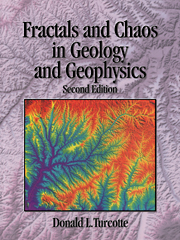Book contents
- Frontmatter
- Contents
- Preface
- Preface to the second edition
- 1 Scale invariance
- 2 Definition of a fractal set
- 3 Fragmentation
- 4 Seismicity and tectonics
- 5 Ore grade and tonnage
- 6 Fractal clustering
- 7 Self-affine fractals
- 8 Geomorphology
- 9 Dynamical systems
- 10 Logistic map
- 11 Slider-block models
- 12 Lorenz equations
- 13 Is mantle convection chaotic?
- 14 Rikitake dynamo
- 15 Renormalization group method
- 16 Self-organized criticality
- 17 Where do we stand?
- References
- Appendix A Glossary of terms
- Appendix B Units and symbols
- Answers to selected problems
- Index
15 - Renormalization group method
Published online by Cambridge University Press: 05 June 2012
- Frontmatter
- Contents
- Preface
- Preface to the second edition
- 1 Scale invariance
- 2 Definition of a fractal set
- 3 Fragmentation
- 4 Seismicity and tectonics
- 5 Ore grade and tonnage
- 6 Fractal clustering
- 7 Self-affine fractals
- 8 Geomorphology
- 9 Dynamical systems
- 10 Logistic map
- 11 Slider-block models
- 12 Lorenz equations
- 13 Is mantle convection chaotic?
- 14 Rikitake dynamo
- 15 Renormalization group method
- 16 Self-organized criticality
- 17 Where do we stand?
- References
- Appendix A Glossary of terms
- Appendix B Units and symbols
- Answers to selected problems
- Index
Summary
Renormalization
In the first eight chapters of this book we considered the fractal behavior of natural systems. This behavior was generally statistical and the physical causes were generally inaccessible. In the six chapters that followed we considered low-order dynamical systems that exhibit chaotic behavior. Because of the low order, the examples are generally quite far removed from natural systems of interest. In this chapter and the next we take a collective view of natural phenomena and consider some applications in geology and geophysics.
Thermodynamics represents the standard approach to collective phenomena. System variables are defined, that is, temperature, pressure, density, entropy; and the evolution of these variables is determined from the first law of thermodynamics (conservation of energy) and the second law of thermodynamics (variation of entropy). Statistical mechanics provides the rational microscopic basis for much of thermodynamics.
In general, neither thermodynamics nor statistical mechanics yields fractal statistics or chaotic behavior. Exceptions include critical points and phase changes. A characteristic feature of a phase change is a discontinuous (catastrophic) change of macroscopic parameters of the system under a continuous change in the system's state variables. For example, when water freezes its viscosity changes from a very small value to a very large value with no change in temperature.
The renormalization group method has been used successfully in treating a variety of phase change and critical-point problems (Wilson and Kagut, 1974). This method often produces fractal statistics and explicitly utilizes scale invariance.
Information
- Type
- Chapter
- Information
- Fractals and Chaos in Geology and Geophysics , pp. 289 - 315Publisher: Cambridge University PressPrint publication year: 1997
